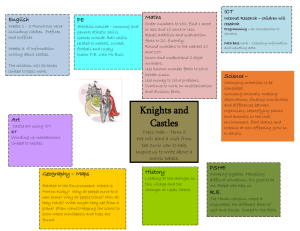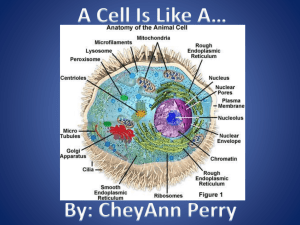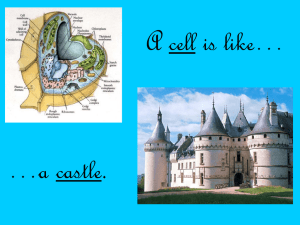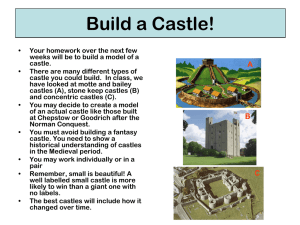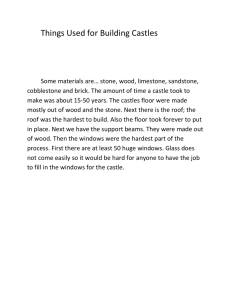Planning for Quality Texts: Invasion (Why were the Norman castles
advertisement
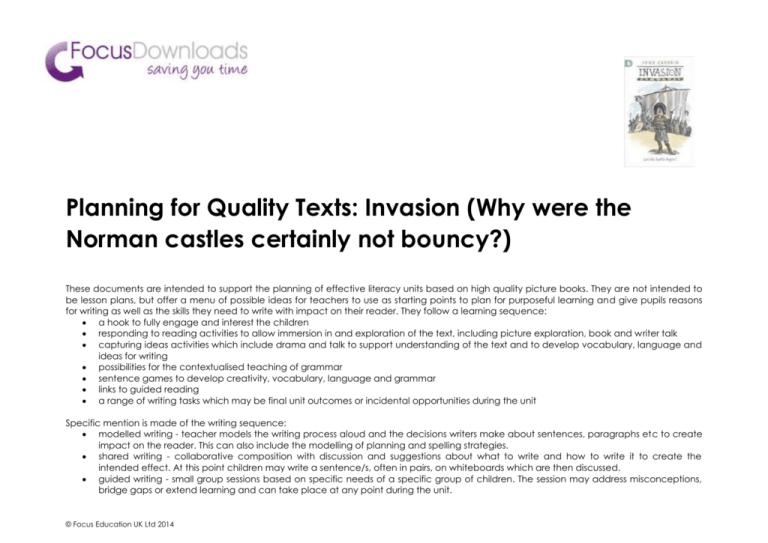
Planning for Quality Texts: Invasion (Why were the Norman castles certainly not bouncy?) These documents are intended to support the planning of effective literacy units based on high quality picture books. They are not intended to be lesson plans, but offer a menu of possible ideas for teachers to use as starting points to plan for purposeful learning and give pupils reasons for writing as well as the skills they need to write with impact on their reader. They follow a learning sequence: a hook to fully engage and interest the children responding to reading activities to allow immersion in and exploration of the text, including picture exploration, book and writer talk capturing ideas activities which include drama and talk to support understanding of the text and to develop vocabulary, language and ideas for writing possibilities for the contextualised teaching of grammar sentence games to develop creativity, vocabulary, language and grammar links to guided reading a range of writing tasks which may be final unit outcomes or incidental opportunities during the unit Specific mention is made of the writing sequence: modelled writing - teacher models the writing process aloud and the decisions writers make about sentences, paragraphs etc to create impact on the reader. This can also include the modelling of planning and spelling strategies. shared writing - collaborative composition with discussion and suggestions about what to write and how to write it to create the intended effect. At this point children may write a sentence/s, often in pairs, on whiteboards which are then discussed. guided writing - small group sessions based on specific needs of a specific group of children. The session may address misconceptions, bridge gaps or extend learning and can take place at any point during the unit. © Focus Education UK Ltd 2014 In addition, cross-curricular links are suggested, including links to challenges from the Learning Challenge Curriculum. Copyright statement: This document should be used within the purchasing organisation only. KS2 Possible Written Outcomes or Incidental Writing Opportunities Speech/thought bubbles for Use Comic Life to create comic strip of Instructions - How to Day in the life of Norman boy Letter home to family Fact File on aspect of life in Norman times fact File on an animal found in the Stone Age Report on a people of Ancient Britain Write more developed text for specific pages Job advertisement for a Page Promotional leaflet/presentation for a day out at Halton castle Wanted poster for William for wanting to invade England Character profile for invented character/s Narrative based on invented castle and family, using planned structure • For sale notice for chosen/invented castle • Information text for the castle of fire • Menu for a banquet/afternoon tea at identified castle • Promotional leaflet/presentation for a day out at chosen castle • Explanation - Why were castles built? • Invented castle information for I Spy Guide to Castles • Wanted poster for character wanting to invade castle © Focus Education UK Ltd 2014 Hook Watch a day in the life of a 10 year old Norman Virtual tour of castle (see useful links) 1. Responding to the Text Visual literacy: who might the boy on the front cover be? Role on the wall for the boy Book talk: find the clues from the book that show he is set in the Norman times Book talk: which is your favourite character? Is there one you do not like? Book talk: why might this battle have happened? Book talk: what stories do you know with castles in them? What genre are they? What are the key features - characters, problem etc Box up a story you know or plot it onto a story mountain or flow chart Writer talk: what kind of language would you expect to see in these stories? Make a list. • Character profile for invented character/s • Narrative based on invented castle and family, using planned structure • Evaluation of castle made from clay or mouldable material 2. Capturing Ideas Debate - Would it be fun to be a child in Norman times • Turn reading area into a castle with storytellers’ throne • Use castle of fire picture and annotate with word bank using nouns, verbs, adverbs, adjectives • Visualise and sketch an invented castle • Annotate sketch with word bank as above • Create a family tree for the royal family living in chosen or invented castle and annotate with characteristics of each person • Invent a threat for the castle and its family • Box up or use a story mountain or flow chart to plan a story for your castle - all is well, threat comes along, castle/characters in danger, danger is overcome, all is well • Develop an opening which describes the castle and its setting • Develop an ending which returns to opening or comments on events • Annotate your plan with key narrative language • Tell your story orally • Explore sayings about castles - king of the © Focus Education UK Ltd 2014 Sentence Games (use throughout unit) Sentence signposts persuasive language game Character game - use feelings (anger, fear, cruelty, joy) what would character say to show not tell how they are feeling Improve a sentence- focus on the grammatical elements that need consolidation or review Sentence starters game from base sentence - focus on fronted adverbials, ing and ed Guided Reading Possibilities 3. Contextualised Grammar Teaching Use of action and dialogue to show characterisation Vary sentence types to build or slow pace Choice of verbs to describe actions 4. Modelled Writing Shared Writing Guided Writing Independent Writing castle, castles in the air, home is my castle • Debate - “A man’s home is his castle MAKING LINKS ACROSS THE CURRICULUM Geography/Science Locating castles on a map Maths Measurements ICT PSHE Useful links https://www.youtube.com/watch?v=GVMvl05hCrI http://www.englishheritage.org.uk/daysout/properties/dover-castle/greattower/virtual-tour/ http://www.youtube.com/watch?v=k6xMK-I_NCo http://www.youtube.com/watch?v=rx-w5nZwTIk Art/DT • Year 4 History: Why were Norman castles certainly not bouncy? Author: Colin Thompson Publisher: Red Fox ISBN- 978-0-099-43942-4 © Focus Education UK Ltd 2014 © Focus Education UK Ltd 2014
